Unit 2 Here are some ways to welcome them
文档属性
| 名称 | Unit 2 Here are some ways to welcome them | 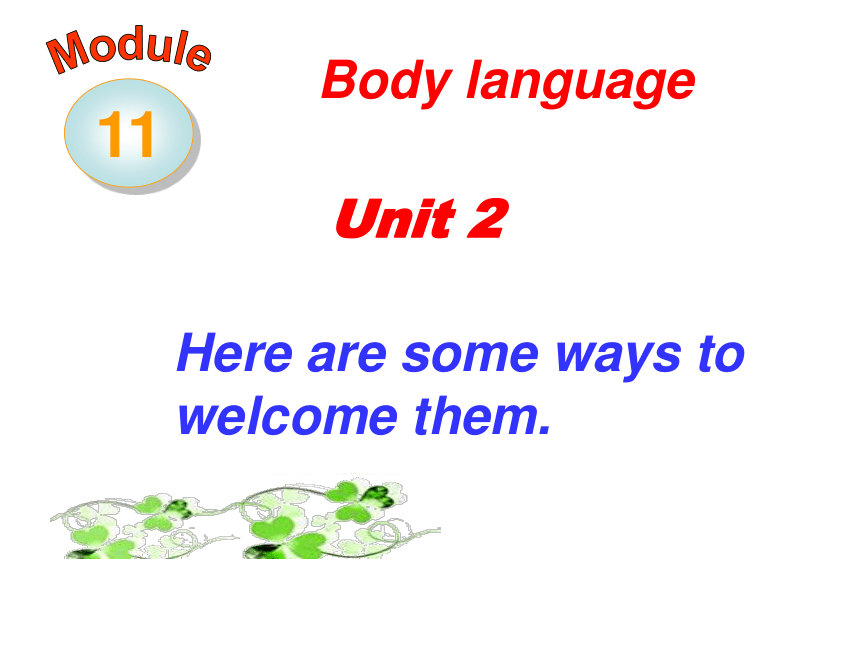 | |
| 格式 | zip | ||
| 文件大小 | 893.7KB | ||
| 资源类型 | 教案 | ||
| 版本资源 | 外研版 | ||
| 科目 | 英语 | ||
| 更新时间 | 2013-09-18 15:40:30 | ||
图片预览

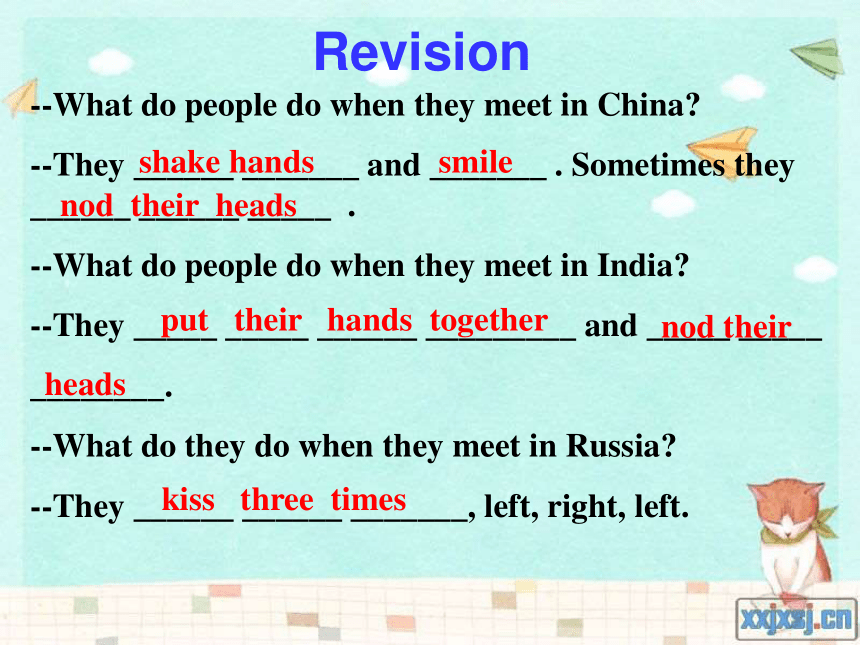
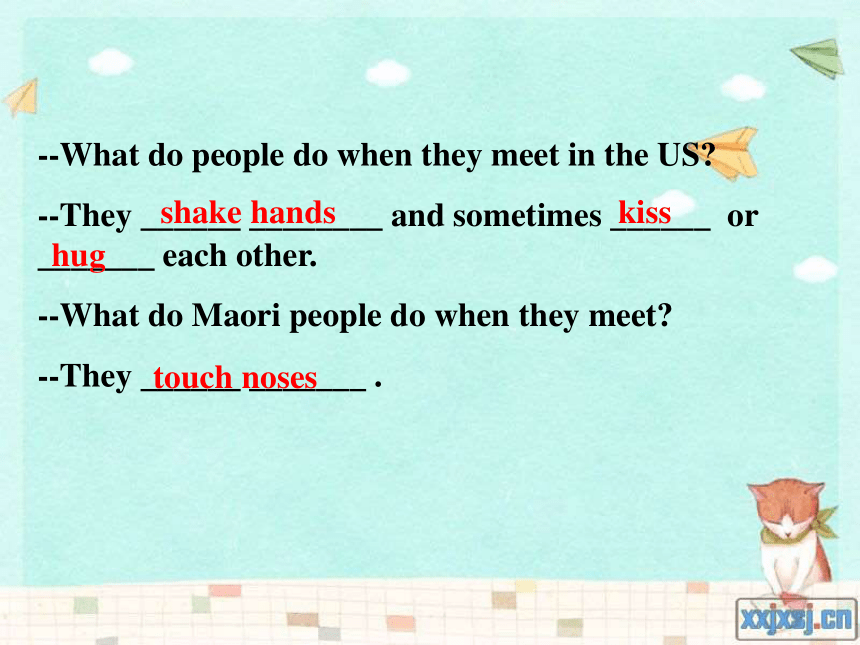
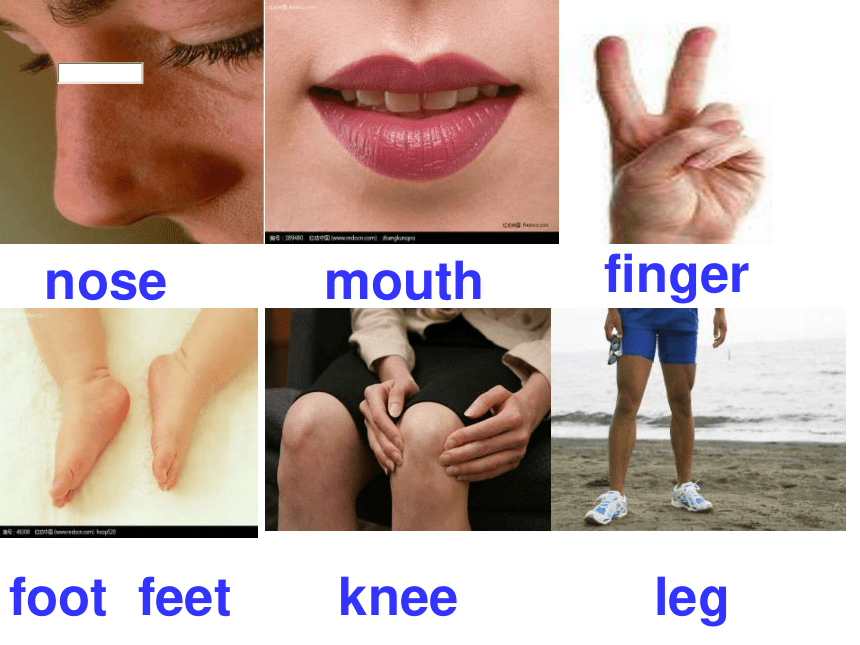
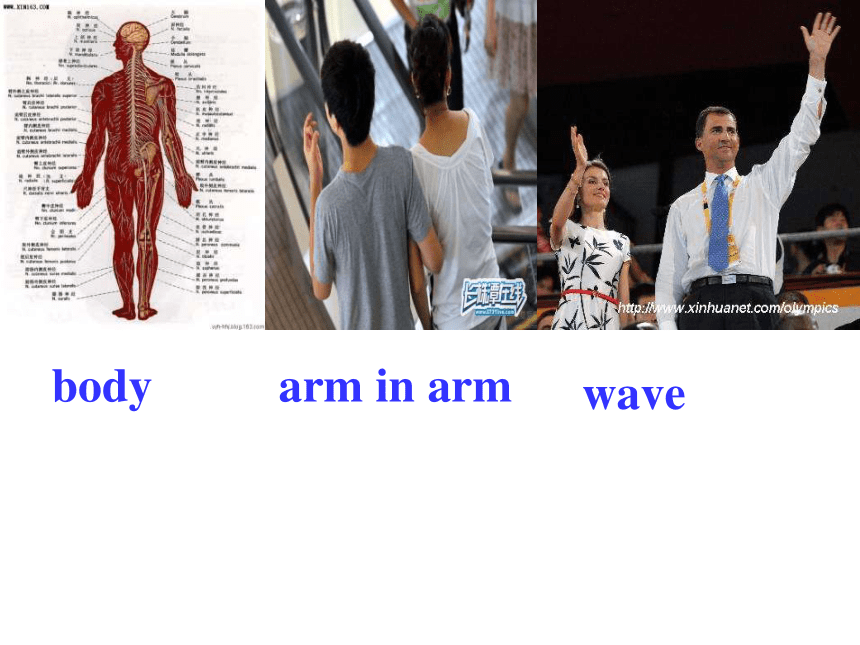
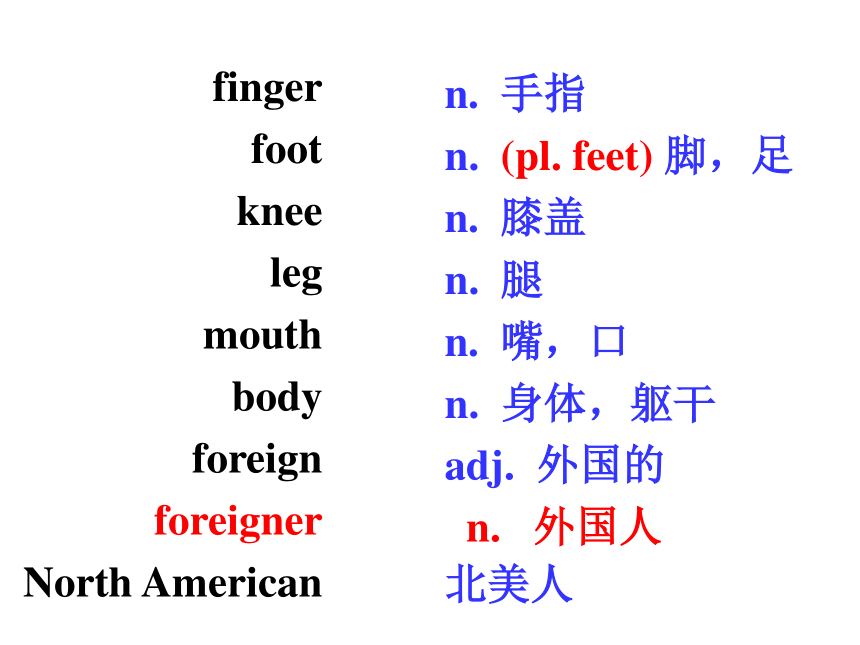
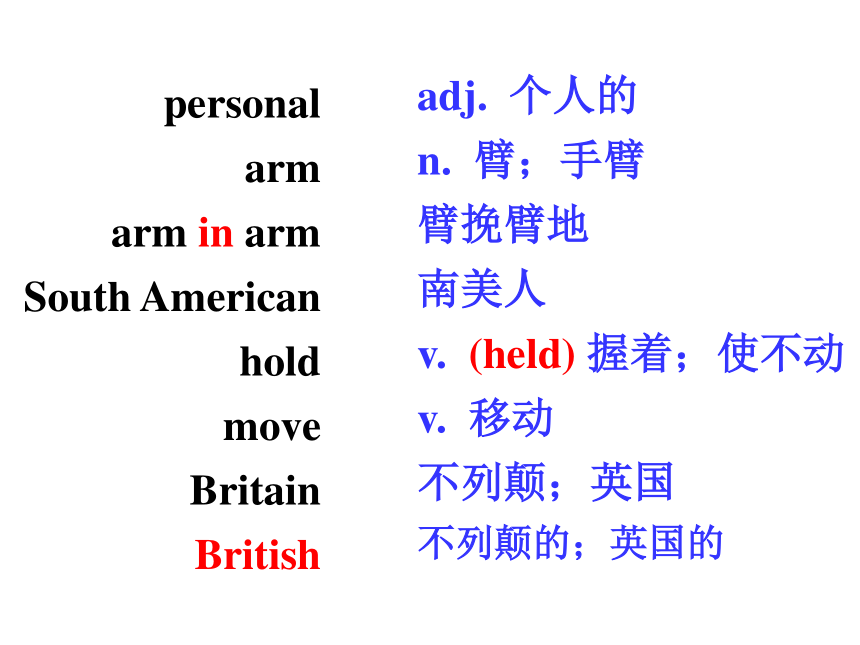
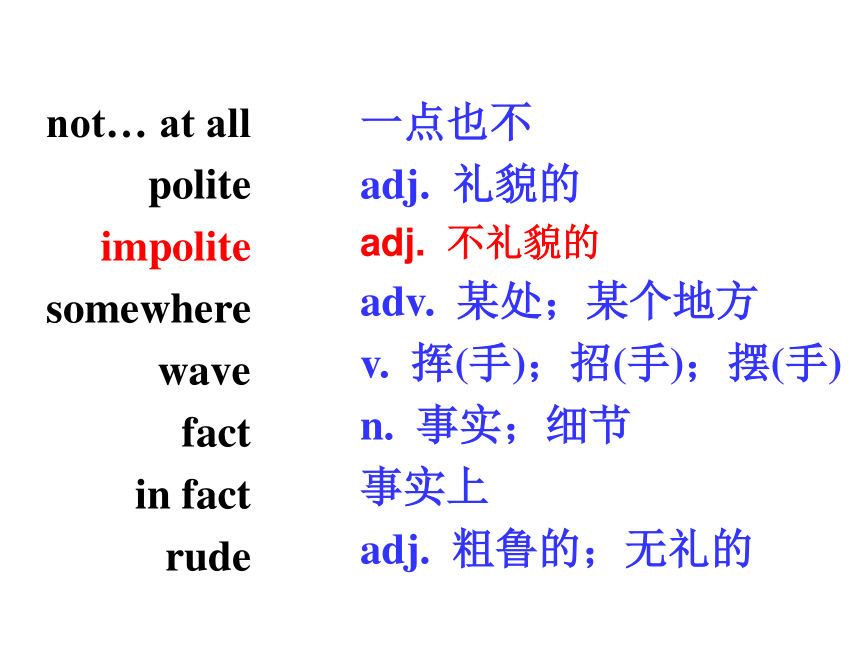
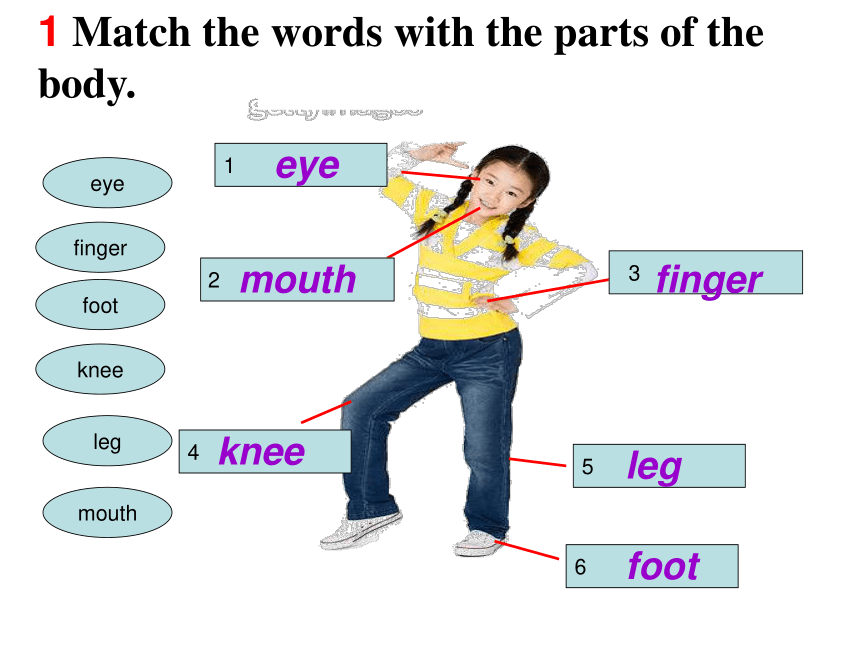
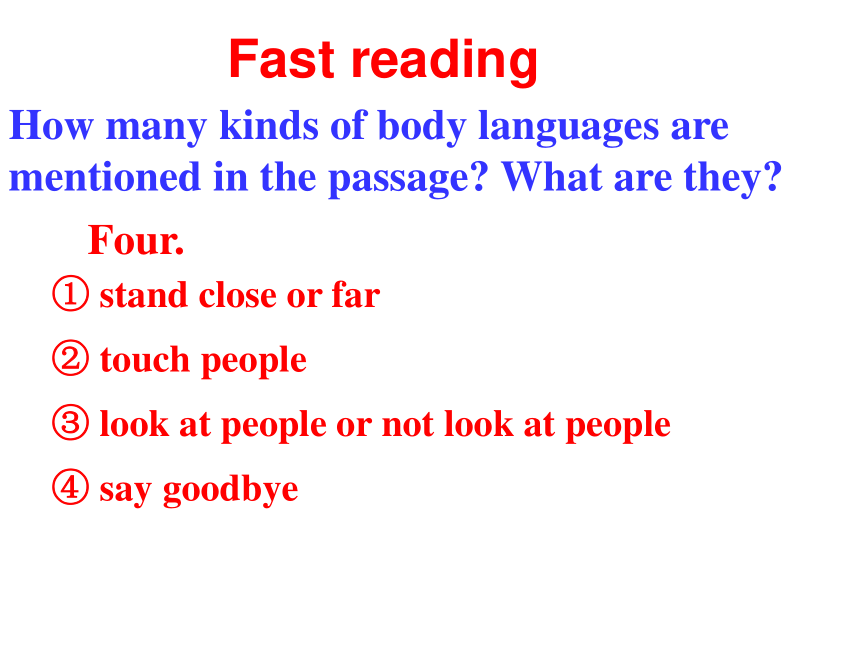


文档简介
课件36张PPT。
Module11 Body language
Unit 2
Here are some ways to welcome them. Revision --What do people do when they meet in China?
--They ______ _______ and _______ . Sometimes they ______ ______ _____ .
--What do people do when they meet in India?
--They _____ _____ ______ _________ and _____ _____
________.
--What do they do when they meet in Russia?
--They ______ ______ _______, left, right, left. shake handssmile nod their heads put their hands togethernod theirheads kiss three times--What do people do when they meet in the US?
--They ______ ________ and sometimes ______ or _______ each other.
--What do Maori people do when they meet?
--They ______ _______ . shake handskisshug touch nosesnosemouthfingerfootfeetkneelegbody arm in armwavefinger
foot
knee
leg
mouth
body
foreign
foreigner
North Americann. 手指
n. (pl. feet) 脚,足
n. 膝盖
n. 腿
n. 嘴,口
n. 身体,躯干
adj. 外国的
n. 外国人
北美人personal
arm
arm in arm
South American
hold
move
Britain
British adj. 个人的
n. 臂;手臂
臂挽臂地
南美人
v. (held) 握着;使不动
v. 移动
不列颠;英国
不列颠的;英国的not… at all
polite
impolite
somewhere
wave
fact
in fact
rude一点也不
adj. 礼貌的
adj. 不礼貌的
adv. 某处;某个地方
v. 挥(手);招(手);摆(手)
n. 事实;细节
事实上
adj. 粗鲁的;无礼的1 Match the words with the parts of the body.eyefingerfootkneelegmouth2 1 4 3 5 6 eyemouthfingerkneelegfoot Fast readingHow many kinds of body languages are mentioned in the passage? What are they?Four.① stand close or far
② touch people③ look at people or not look at people④ say goodbye Read paragraph 1 and 2Who is going to arrive very soon?Lingling’s new foreign students.You can stand close to people in _____ _______ _____ . But you don’t stand too close to _______ __________ . Give them ______ ________ ________ . theMiddle EastNorth Americans more personal spaceHere are some ways to welcome them.这有一些迎接他们的方式。 the way to do sth. = the way of doing sth.
做某事的方式 这有一些学英语的好方法。Here are some good ways to learn English.Here are some good ways of learning English.You can stand close to people in the Middle East but don’t stand too close to North Americans!你可以和中东地区的人们站得近些;但是不能离北美人太近。 be close to …… 离……近 我的家里学校很近。My home is close to school.住得离……近
坐得离……近 live close to sit close toRead paragraph 3Chinese girls often _____ _____ ____ ______ with their friends.
South Americans sometimes ______
_____ ______ when they talk to you.
In Britain many people _____ ______
_____ ______ ____ ______ ______ at all. walk arm inarmhold your arm don’t like other people to touch themHow about touching people?
那么关于身体接触呢?How about doing sth. = What about doing sth.
做某事怎么样? 明天去游泳怎么样?How about going swimming tomorrow? 去野餐怎么样?What about having a picnic?But in Britain many people don’t like people to touch them at all.但是在英国,许多人一点也不喜欢别人碰他们。not…. at all 一点也不……我一点儿也不喜欢看电视。I don’t like watching TV at all.Tony一点儿也不想去购物。Tony doesn’t want to go shopping at all. Paragraph 4 and 5Check the true sentences. ( T or F)
It is polite to look at each other when they talk all around the world.
In Britain and the US, it’s polite to look at each other when they talk.
In Greece, it’s polite to wave to say goodbye.
In China, it’s polite to wave to say goodbye. ﹙ ﹚﹙ ﹚﹙ ﹚﹙ ﹚√××√ Is body language the same in different countries?
No, it isn’t the same.
2. Is it all right to stand close to people in the Middle East?
Yes, it is all right to stand close to people in the Middle East.3. Do the British like touching people?
No, they don’t.
4. Do Americans look at people when they talk?
Yes, they do.
5. Do people in Greece wave goodbye?
No, they don’t. It’s not polite.3 Check ( ) the body language you can
use in different countries and places.√√√√√4 Complete the passage with the words
from the box.Lingling: People from (1) ________
countries have different body
languages from us. In (2)
________ people don’t like to Britain, fact, foreign, hold, move
personal, polite, rude, someone, waveforeignBritain touch other people, but in South America they like to (3) _______ on to you so you can’t (4) _______ away. Remember to give (5) __________ from North America lots of (6) _________ space. In some countries it isn’t (7) _______ to look at people when you talk. And it isn’t polite to (8) ______ goodbye in Greece. In (9) _______, it’s quite (10) _______!holdmovesomeonepersonalpolitewavefactrude课时重点回顾全世界
肢体语言
在中东
私人空间
臂挽臂地
移开/移走
一点也不around the world
body language
in the Middle East
personal space
arm in arm
move away
not …at allLanguage points1. Chinese girls often walk arm in arm with their friends.
中国女孩子行走时经常和她们的朋友臂挽臂。
arm in arm 臂挽臂地
The two girls like to walk arm in arm.
拓展: hand in hand 手挽手
shoulder to shoulder 肩并肩
face to face 面对面2. South Americans sometimes hold your arm when they talk to you…
南美人有时在和你说话的时候会抓着你的手臂……
hold 握住,抓住,过去式是held。
The mother held the baby in her arm.
那位母亲把婴儿抱在怀里。
你能帮我拿着这些书吗?
Can you hold these books for me? 3. But in Britain many people don’t like other people to touch them at all.
但是在英国许多人根本不喜欢其他人碰他们。
Not… at all “一点也不,无论如何不”,用于疑问句和否定句,表示强调。
他们一点儿都不高兴。
They weren’t happy at all .4. In fact, it’s very rude!
事实上,这是很无礼的。
in fact “事实上,实际上”
He can’t speak Russian. In fact, he can
speak French.Writing5 Work in groups. Talk about your class
rules.— Shall we stand up when we answer a
question in class?
— Yes, we shall.6 Make a list of class rules for new
students in your school.Stand up when you answer a question in class.
Don’t be late for class.
Be polite to the teacher.
Don’t eat food in class.
…根据英文解释,指出下列各个身体部位。
the long thin parts on your hand
the part of your face which you put food into, or which you use for speaking
the part of your face that you smell with and breathe (呼吸) through fingersmouthnose4. the part of your body that you stand
on and walk on
5. either of the two long parts of your
body that your feet are joined to
6. the joint (关节、结合处) that bends in
the middle of your leg
7. one of the two long parts of your body
between your shoulders and your
hands footlegskneearmII. 按照句子意思,填入恰当的词。 How many f________ languages can
you speak?
2. Your feelings about him is very
__________ (person). We cannot trust
your words.
3. I cannot find my glasses. I must put it
_____________ (某个地方).foreignpersonalsomewhere4. We Chinese like to ______ (wave) to say
goodbye.
5. When we arrived there, he was
__________ (hold) a knife in his hand.
6. You should be ________ (有礼貌的) to
the older.
7. I didn’t mean to be _______ (失礼的),
but I have to leave early.waveholdingpoliterude8. — Do you like the Japanese food?
— _______________. (一点也不)
9. They are very good friends. They
always walk _______________ (臂挽臂
地) when they are together.
10. You know what? ____________ (事实
上), you are right. I need to drop the
idea at once.Not at allarm in armIn factPreview
To preview Unit 3 Language in use on Page 70-71HomeworkWrite a short passage about the body language in China. You can use the following questions to help you.
How do Chinese greet each other when they meet?
How do Chinese say goodbye?
…
Module11 Body language
Unit 2
Here are some ways to welcome them. Revision --What do people do when they meet in China?
--They ______ _______ and _______ . Sometimes they ______ ______ _____ .
--What do people do when they meet in India?
--They _____ _____ ______ _________ and _____ _____
________.
--What do they do when they meet in Russia?
--They ______ ______ _______, left, right, left. shake handssmile nod their heads put their hands togethernod theirheads kiss three times--What do people do when they meet in the US?
--They ______ ________ and sometimes ______ or _______ each other.
--What do Maori people do when they meet?
--They ______ _______ . shake handskisshug touch nosesnosemouthfingerfootfeetkneelegbody arm in armwavefinger
foot
knee
leg
mouth
body
foreign
foreigner
North Americann. 手指
n. (pl. feet) 脚,足
n. 膝盖
n. 腿
n. 嘴,口
n. 身体,躯干
adj. 外国的
n. 外国人
北美人personal
arm
arm in arm
South American
hold
move
Britain
British adj. 个人的
n. 臂;手臂
臂挽臂地
南美人
v. (held) 握着;使不动
v. 移动
不列颠;英国
不列颠的;英国的not… at all
polite
impolite
somewhere
wave
fact
in fact
rude一点也不
adj. 礼貌的
adj. 不礼貌的
adv. 某处;某个地方
v. 挥(手);招(手);摆(手)
n. 事实;细节
事实上
adj. 粗鲁的;无礼的1 Match the words with the parts of the body.eyefingerfootkneelegmouth2 1 4 3 5 6 eyemouthfingerkneelegfoot Fast readingHow many kinds of body languages are mentioned in the passage? What are they?Four.① stand close or far
② touch people③ look at people or not look at people④ say goodbye Read paragraph 1 and 2Who is going to arrive very soon?Lingling’s new foreign students.You can stand close to people in _____ _______ _____ . But you don’t stand too close to _______ __________ . Give them ______ ________ ________ . theMiddle EastNorth Americans more personal spaceHere are some ways to welcome them.这有一些迎接他们的方式。 the way to do sth. = the way of doing sth.
做某事的方式 这有一些学英语的好方法。Here are some good ways to learn English.Here are some good ways of learning English.You can stand close to people in the Middle East but don’t stand too close to North Americans!你可以和中东地区的人们站得近些;但是不能离北美人太近。 be close to …… 离……近 我的家里学校很近。My home is close to school.住得离……近
坐得离……近 live close to sit close toRead paragraph 3Chinese girls often _____ _____ ____ ______ with their friends.
South Americans sometimes ______
_____ ______ when they talk to you.
In Britain many people _____ ______
_____ ______ ____ ______ ______ at all. walk arm inarmhold your arm don’t like other people to touch themHow about touching people?
那么关于身体接触呢?How about doing sth. = What about doing sth.
做某事怎么样? 明天去游泳怎么样?How about going swimming tomorrow? 去野餐怎么样?What about having a picnic?But in Britain many people don’t like people to touch them at all.但是在英国,许多人一点也不喜欢别人碰他们。not…. at all 一点也不……我一点儿也不喜欢看电视。I don’t like watching TV at all.Tony一点儿也不想去购物。Tony doesn’t want to go shopping at all. Paragraph 4 and 5Check the true sentences. ( T or F)
It is polite to look at each other when they talk all around the world.
In Britain and the US, it’s polite to look at each other when they talk.
In Greece, it’s polite to wave to say goodbye.
In China, it’s polite to wave to say goodbye. ﹙ ﹚﹙ ﹚﹙ ﹚﹙ ﹚√××√ Is body language the same in different countries?
No, it isn’t the same.
2. Is it all right to stand close to people in the Middle East?
Yes, it is all right to stand close to people in the Middle East.3. Do the British like touching people?
No, they don’t.
4. Do Americans look at people when they talk?
Yes, they do.
5. Do people in Greece wave goodbye?
No, they don’t. It’s not polite.3 Check ( ) the body language you can
use in different countries and places.√√√√√4 Complete the passage with the words
from the box.Lingling: People from (1) ________
countries have different body
languages from us. In (2)
________ people don’t like to Britain, fact, foreign, hold, move
personal, polite, rude, someone, waveforeignBritain touch other people, but in South America they like to (3) _______ on to you so you can’t (4) _______ away. Remember to give (5) __________ from North America lots of (6) _________ space. In some countries it isn’t (7) _______ to look at people when you talk. And it isn’t polite to (8) ______ goodbye in Greece. In (9) _______, it’s quite (10) _______!holdmovesomeonepersonalpolitewavefactrude课时重点回顾全世界
肢体语言
在中东
私人空间
臂挽臂地
移开/移走
一点也不around the world
body language
in the Middle East
personal space
arm in arm
move away
not …at allLanguage points1. Chinese girls often walk arm in arm with their friends.
中国女孩子行走时经常和她们的朋友臂挽臂。
arm in arm 臂挽臂地
The two girls like to walk arm in arm.
拓展: hand in hand 手挽手
shoulder to shoulder 肩并肩
face to face 面对面2. South Americans sometimes hold your arm when they talk to you…
南美人有时在和你说话的时候会抓着你的手臂……
hold 握住,抓住,过去式是held。
The mother held the baby in her arm.
那位母亲把婴儿抱在怀里。
你能帮我拿着这些书吗?
Can you hold these books for me? 3. But in Britain many people don’t like other people to touch them at all.
但是在英国许多人根本不喜欢其他人碰他们。
Not… at all “一点也不,无论如何不”,用于疑问句和否定句,表示强调。
他们一点儿都不高兴。
They weren’t happy at all .4. In fact, it’s very rude!
事实上,这是很无礼的。
in fact “事实上,实际上”
He can’t speak Russian. In fact, he can
speak French.Writing5 Work in groups. Talk about your class
rules.— Shall we stand up when we answer a
question in class?
— Yes, we shall.6 Make a list of class rules for new
students in your school.Stand up when you answer a question in class.
Don’t be late for class.
Be polite to the teacher.
Don’t eat food in class.
…根据英文解释,指出下列各个身体部位。
the long thin parts on your hand
the part of your face which you put food into, or which you use for speaking
the part of your face that you smell with and breathe (呼吸) through fingersmouthnose4. the part of your body that you stand
on and walk on
5. either of the two long parts of your
body that your feet are joined to
6. the joint (关节、结合处) that bends in
the middle of your leg
7. one of the two long parts of your body
between your shoulders and your
hands footlegskneearmII. 按照句子意思,填入恰当的词。 How many f________ languages can
you speak?
2. Your feelings about him is very
__________ (person). We cannot trust
your words.
3. I cannot find my glasses. I must put it
_____________ (某个地方).foreignpersonalsomewhere4. We Chinese like to ______ (wave) to say
goodbye.
5. When we arrived there, he was
__________ (hold) a knife in his hand.
6. You should be ________ (有礼貌的) to
the older.
7. I didn’t mean to be _______ (失礼的),
but I have to leave early.waveholdingpoliterude8. — Do you like the Japanese food?
— _______________. (一点也不)
9. They are very good friends. They
always walk _______________ (臂挽臂
地) when they are together.
10. You know what? ____________ (事实
上), you are right. I need to drop the
idea at once.Not at allarm in armIn factPreview
To preview Unit 3 Language in use on Page 70-71HomeworkWrite a short passage about the body language in China. You can use the following questions to help you.
How do Chinese greet each other when they meet?
How do Chinese say goodbye?
…
同课章节目录
- Module 1 Lost and found
- Unit 1 Whose bag is this?
- Unit 2 Are they yours?
- Unit 3 Language in use
- Module 2 What can you do ?
- Unit 1 I can play the piano
- Unit 2 I can run really fast
- Unit 3 Language in use
- Module 3 Making plans
- Unit 1 What are you going to do at the weekends?
- Unit 2 We're going to cheer the players.
- Unit 3 Language in use
- Module 4 Life in the future
- Unit 1 Everyone will study at home
- Unit 2 Every family will have a small plane.
- Unit 3 Language in use
- Module 5 Shopping
- Unit 1 What can I do for you?
- Unit 2 You can buy everything on the Internet
- Unit 3 Language in use
- Module 6 Around town
- Unit 1 Could you tell me how to get to the Nationa
- Unit 2 The London Eye is on your right.
- Unit 3 Language in use
- Revision module A
- Module 7 My past life
- Unit 1 I was born in a small village.
- Unit 2 I was born in Quincy.
- Unit 3 Language in use
- Module 8 Story time
- Unit 1 Once upon a time….
- Unit 2 Goldilocks hurried out of the house.
- Unit 3 Language in use
- Module 9 Life history
- Unit 1 He left school and began work at the age of
- Unit 2 He decided to be an actor.
- Unit 3 Language in use
- Module 10 A holiday journey
- Unit 1 What did you do?
- Unit 2 This morning we took a walk.
- Unit 3 Language in use
- Module 11 Body language
- Unit 1 They touch noses!
- Unit 2 Here are some ways to welcome them.
- Unit 3 Language in use
- Module 12 Western music
- Unit 1 It's so beautiful!
- Unit 2 Vienna is the centre of European classical
- Unit 3 Language in use
- Revision module B
